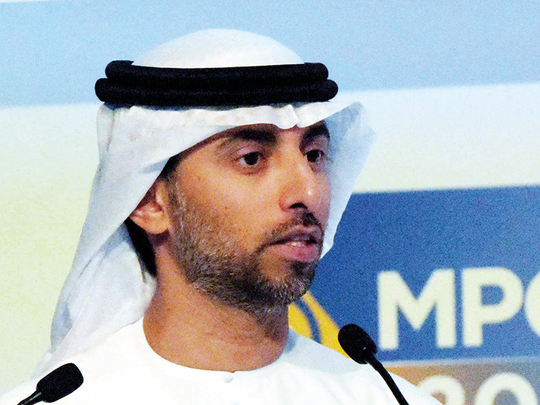
BRATISLAVA
Suhail Al Mazrouei, the UAE Minister of Energy and Industry, has played down the impact of the recent US decision to withdraw from Iran nuclear deal on Opec (Organisation of the Petroleum Exporting Countries), saying the organisation has been through a lot in the past, reflecting its resilience during geopolitical issues that arise on regional and international levels.
“I don’t think this time is going to be different in terms of dealing with such issues,” the minister said.
In an interview with the Emirates News Agency, WAM, on the sidelines of the GLOBSEC 2018 Bratislava Forum in Slovakia, the UAE Minister, who is also president of the Opec Conference 2018, further stated: “It is a non-political organisation, and that’s the beauty of this group. Opec and non-Opec member states today are 24 countries covering a large scope — both geographical and diversity in production.”
Al Mazroui went on to say that there are more significant issues to deal with, such as a decline in (oil) production in bigger countries including Venezuela, and “we are managing well.”
“I’m not worried about what is happening regarding sanctions on some of the member countries, and how these events are going to affect how Opec looks or deals with things,” he affirmed.
As for Adnoc’s recent announcement concerning the Downstream Expansion Strategy, Al Mazroui said that the strategy is in line with UAE policy. This involves “maximising the value of every barrel, so instead of exporting crude, we will be exporting products allowing for the manufacturing industry to expand in Abu Dhabi and the UAE.”
It’s going to provide job opportunities — 15,000 as the Adnoc strategy indicated — which will further diversify the UAE economy, moving away from just exporting crudes, the Minister added.
“We will have less exporting of crude, and more of exporting products and materials that the world needs through joint ventures with the manufacturing world, and with partners in the East and here in Europe and whoever is going to partner with us in this $45 billion investment,” Al Mazroui explained.
Water worries
He also spoke about the importance of water, saying it is a very essential and vital commodity, especially for countries like the UAE. “I am more worried about water than I am about electricity and hydrocarbons. It’s not just water, its clean water that we will need in the future for the next generations,” he added.
He explained that in 2017 the UAE formulated the Water Security Strategy 2036, which aims to ensure sustainable access to water in line with local regulations, standards of the World Health Organisation, and the UAE’s vision to achieve prosperity and sustainability.
Al Mazroui went on to say that the UAE is “looking to reduce the per capita usage of water, replacing the underground usage of water for agriculture with stage 3 treated water, as well as accessing aquifer water” as means to find sustainable solutions and alternatives for the growing agriculture sector.
The overall objectives of the strategy are to reduce total demand for water resources by 21 per cent, increase the water productivity index to $110 per cubic metre, reduce the water scarcity index by three degrees, increase the reuse of treated water to 95 per cent and increase national water storage capacity up to two days.












